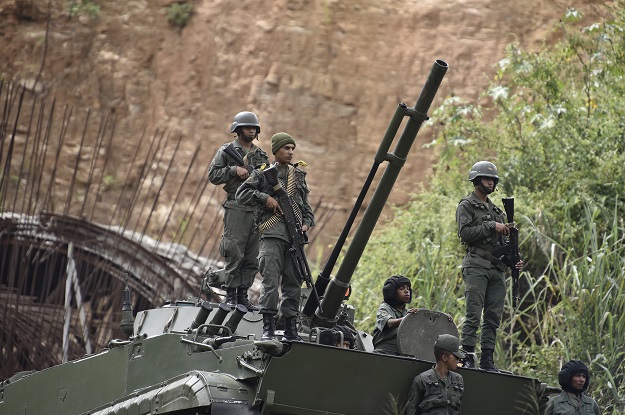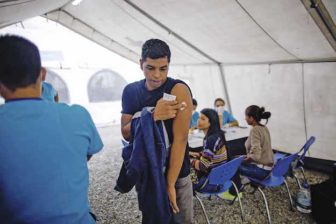Professor Ricardo Hausmann’s heart is in the right place, but his proposal of a military intervention to save Venezuela from Nicolás Maduro’s government is simply not going to happen. Nor would it work.
To start, the only way a regime-changing armed assault on Venezuela can succeed is if the U.S. military takes the lead in the fight. Setting aside the Donald Trump factor for the moment, the legacy of over a century of U.S. direct and indirect meddling in the internal affairs of nearly every country in the Americas means nobody in the hemisphere is going to countenance a military invasion directed by Washington.
Arguably a Latin American country such as Brazil might direct U.S. forces, as happened with the MOMEP U.N. force that arbitrated the Ecuador-Peru conflict in the 1990s. Indeed, this would be consistent with the calls for greater regional partnership issued by the head of U.S. Southern Command, Navy Adm. Kurt Tidd, in Congressional testimony last April. However, undertaking joint jungle warfare training exercises in the Brazilian Amazon is a far cry from letting a foreign power send American troops into battle and some, inevitably, to their death. It also assumes that Trump would turn down the opportunity to prove himself the greatest military leader in American – or world – history.
Still, let us assume for the sake of argument that Trump decided to hand leadership to regional partners, putting the full might of the U.S. military at their disposal. Who in the Americas has the capability to plan and direct such an invasion? This is not to besmirch the quality of military leadership throughout the region, but rather to point out that the logistical and strategic scale of such an operation is simply beyond the training programs and experience of the collected Latin American officers’ corps. A Brazilian, Chilean, Colombian, or Mexican might be the titular head, but the de facto operating and strategic control will rest with the U.S. military and Washington. At the end of the day, Hausmann’s idea would only create more internal turmoil in a country already plagued with a long-standing political and economic crisis.
But these are not the reasons why Hausmann’s appeal for armed intervention will likely fall on deaf ears. Sovereignty is a sacrosanct principle in Latin American diplomacy, and consensual political accommodation its prayer. Inter-American affairs are consistently marked by the blocking of precedents that might allow any kind of future foreign intervention in domestic affairs. Indeed, we need only look at the Organization of American States’ failure to fully deploy the Inter-American Democratic Charter in the Venezuelan case.
Hausmann seeks to skirt the sovereignty challenge by suggesting Venezuela’s National Assembly impeach Maduro and name a new government that might then invite a foreign liberating force. This is a technicality that won’t impress regional diplomats. It is not too far of a stretch to see this being used as a precedent for armed intervention next time there is major discord between the executive and the legislature in other Latin American countries such as, depending on your degree of militancy, contemporary Bolivia, Brazil, Ecuador, Honduras or Nicaragua.
Perhaps the most penetrating critique of Hausmann’s proposal comes from his total failure to address the history of armed intervention to impose democracy. As U.S. adventures in the Middle East bluntly demonstrate, it simply does not work. Latin American leaders know this and it is reflected in their approach to promoting democracy.
A country’s political regime – authoritarian or democratic – is grounded in the underlying balance of social and economic power in a country. Venezuela’s current malaise reflects the realities of walking this political tightrope. When Venezuelan President Hugo Chavez tried to revise the constitution in 2007, the electorate decided it entailed an undue amplification of the president’s power and rejected it. Similarly, Venezuelans responded with disquiet to the Maduro presidency in 2015 by handing the opposition a thumping victory in congressional elections. Checks and balances were in democratic operation. The ruling PSUV’s ambitions were curtailed, but it remained in power because the opposition failed to provide a credible alternative that would believably address the challenges faced by the country’s legion poor.
Beyond the apparent absence of a credible opposition in Venezuela, one of the key reasons Maduro has politically survived is his regime’s tight control over the military and the economy. Elite interests are now indelibly entwined with total control of the state. Destabilizing the interests represented by Maduro’s compact with the Armed Forces could deepen impoverishment and potentially lead to a catastrophic civil war. Again, the opposition is offering no clear path to addressing this challenge, leaving the people to stick with the devil they know, not the greater hell that could come.
For Venezuelans, this points to an even greater disaster than the one highlighted by Hausmann. There appears to be no credible option for a competent government. Even if there were, the technocrats and bureaucrats needed to make a country run have either left or been driven from office, leaving real questions about the domestic capacity to rebuild the country. Mix this with Hausmann’s call for a democracy-restoring armed intervention and you get a recipe for sustained, military occupation, which could be conveniently funded by the world’s largest oil reserve. Again, we have seen how poorly this worked in the Middle East.
The Venezuelan tragedy is exceedingly complex and defies simplistic solutions.
Proposing non-starter ideas like an armed intervention wastes the valuable time of policy makers grappling with more pressing questions, such as how to get humanitarian relief into Venezuela and reassuring the country’s corrupt elite that they will be allowed a quiet exit if they engineer a domestic transition back to representative governance.
Hausmann’s grief and pain is understandable and shared. Intervention by invitation, however, is not a viable solution to Venezuela’s crisis.
—
Burges is a senior lecturer in international relations at the Australian National University and visiting scholar at Carleton University.
Chagas Bastos is a research associate with the Centre for Latin American Studies at University of Cambridge.








